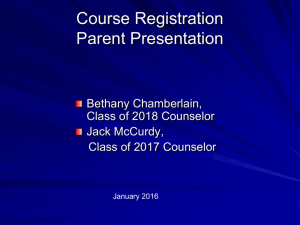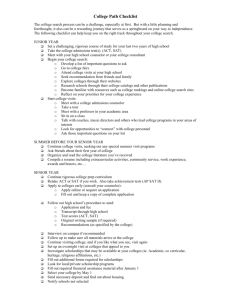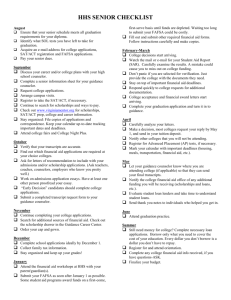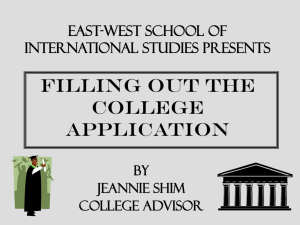Community College
advertisement
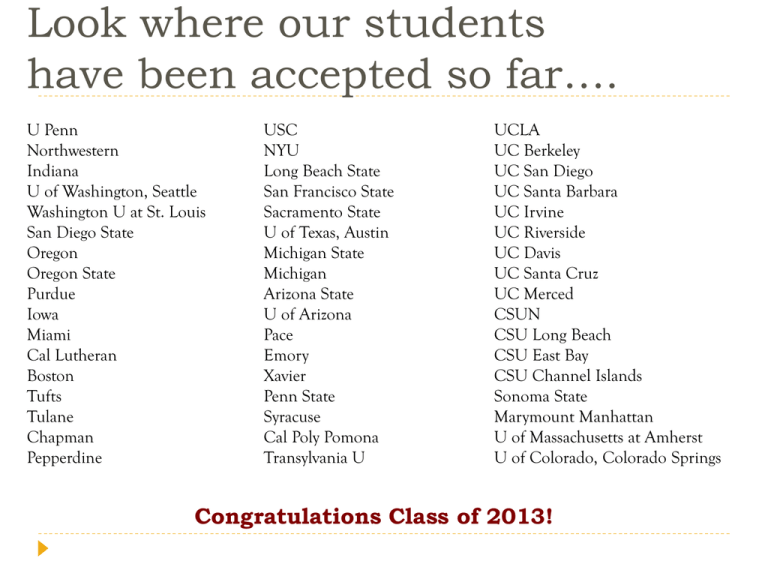
Look where our students have been accepted so far…. U Penn Northwestern Indiana U of Washington, Seattle Washington U at St. Louis San Diego State Oregon Oregon State Purdue Iowa Miami Cal Lutheran Boston Tufts Tulane Chapman Pepperdine USC NYU Long Beach State San Francisco State Sacramento State U of Texas, Austin Michigan State Michigan Arizona State U of Arizona Pace Emory Xavier Penn State Syracuse Cal Poly Pomona Transylvania U UCLA UC Berkeley UC San Diego UC Santa Barbara UC Irvine UC Riverside UC Davis UC Santa Cruz UC Merced CSUN CSU Long Beach CSU East Bay CSU Channel Islands Sonoma State Marymount Manhattan U of Massachusetts at Amherst U of Colorado, Colorado Springs Congratulations Class of 2013! 11th Grade: Graduation and Beyond Teri Owen, College Counselor Aubrey Pasmyn, Counselor LAUSD GRADUATION REQUIREMENTS Subject Requirements / Credits Required English College Prep Math College Prep Biology Science College Prep Physical Science Social Science Visual/Performing Arts Physical Education Health Applied Technology Electives In addition: CAHSEE Math/ELA, Computer Literacy, Service Learning 40 credits 20 credits 10 credits 10 credits 30 credits 10 credits 20 credits 5 credits 10 credits 75 credits = total of 230 credits CREDIT RECOVERY OPTIONS Summer School LAUSD: one 5 credit course at Chatsworth or Grant HS (get enrollment form from counselor for replacement of Ds and Fs only) OFL: two-three 5 credit courses at an OFL Center (get enrollment form from counselor) OFY: two 5 credit courses at an OFY Center (get enrollment form from counselor) Adult School: various courses available (see counselor) Community Colleges: accepted courses on handout ROP: Check counseling office in May for options WVOC: Check with WVOC for available classes Credit Recovery Options During the School Year Adult School: one course at a time when student is in good standing at Taft Community College: classes listed on handout, as approved by College Office ROP: course offerings vary, see counselor, Fall 2013 WVOC: course offerings vary, check with WVOC and counselor Fall 2013 Students will be notified if and when any other options are made available. Senior Graduation Check Counselors meet w/ seniors Sept to review remaining graduation requirements and options for credit recovery Parents notified, in writing, regarding student’s graduation status. If student missing any graduation requirements, parent will be notified and options will be provided Seniors needing credit recovery have priority for adult school courses offered at Taft A senior parent meeting in the Fall to review Taft policies regarding participation in senior activities LIFE AFTER HIGH SCHOOL… Students choose to do many different things after high school depending on their personal situation. Some options include: Employment Vocational School Military Gap Year College/University College Name Game How many colleges can you think of??? There are over 3,000 schools in the United States alone… What’s in a name??? DON’T FALL INTO THE NAME TRAP! Just because you haven’t heard of it, doesn’t mean it’s not an excellent school! California’s Higher Education System Community Colleges – 2 year colleges California State Universities – 4 year universities (i.e. CSUN, CSULA, San Diego State, Cal Poly San Luis Obispo) University of California – 4 year universities (i.e. Pierce,Valley, Santa Monica, Moorpark, Glendale) (i.e. UCB, UCLA, UCSB, UCSD, UCI, UCD, UCSC, UCR, UCM) Private Universities – 4 year colleges and universities (i.e. USC, Pepperdine, Loyola Marymount, Cal Lutheran) UC/CSU A-G Eligibility Requirements 2 years required (3-4 recommended) 4 years required 3 years required (4 recommended) 1 year biological, 1 year physical (3-4 years recommended) E-World Language: 2 years required (3-4 recommended) F-Fine Art: 1 year required G-Additional Academic Elective requirement-1 year min. Eligible DOES NOT equal competitive! A-Social Studies: B-English: C-Math: D-Lab Science: Standardized Testing Options: SAT Reasoning (2400 pt scale) or ACT (36 pt scale) 3 ½ hr test; equally accepted Required by most 4-year universities SAT Reasoning: Math,Verbal, Writing ACT: Math, English, Reading, Science, Writing Can be taken multiple times SAT Subject Tests (800 pt scale) 1 hr test in specific subject areas 2 or 3 required by some 4-year schools Some UC Campuses recommend tests for certain majors Student chooses which tests to take Can be taken multiple times Testing Tips Take each test more than once to improve scores Test prep (practice makes a difference) Prep books Prep courses Tutors / Practice exams 2 fee waivers for each test available, if eligible (i.e. school lunch program) Take Subject Test(s) after completing subject courses College Admittance Criteria Most schools take a holistic approach Academics: Test scores: SAT/ACT, Subject Tests (if required) Extracurricular activities at school: Grades (Cs or better, Ds are not accepted for college) Challenging coursework Concurrent enrollment in community college classes Sports, clubs, music, drama, leadership, etc. Community service / Volunteer work outside school: Find your passion! Make a commitment! College Admittance Criteria Personal Essays (if required) Letters of Recommendation (if required or optional; students must give counselors/teachers advance notice) Participation in special programs Leadership Life experience Personal qualities (what makes student unique and a good fit) Awards / recognition Summer programs, internships, employment, etc. Special factors Talent, legacy, first in family to attend college, diversity, etc. Deciphering GPAs/Class Rank Every Taft student has 3 unique GPAs LAUSD GPA: 9th – 11th grade marks on a 4.0 scale, with a ¼ pt. weighting for all AP classes (senior ranking is determined with this GPA, recalculated after 12th grade fall final marks) UC/CSU GPA: 10th -11th grade marks on a 4.0 scale, with a full pt. weighting for all AP classes and applicable honors courses (see flyer) Financial Aid GPA: 10th-11th grade unweighted marks on a 4.0 scale (excludes PE) Deciding Factors: 4-year vs. 2-year Housing Location Cost/Financial aid package Degrees offered Weather Extracurricular activities Size (small vs. big) Special programs Unique college life aspects Academic focus What can each school offer? What is the best fit for student? Private Schools with a Special Focus Historically black colleges Liberal Arts colleges (i.e. Scripps, Smith, Bryn Mawr) Fine Arts / Dramatic Arts schools (i.e. Whittier, Claremont) Women’s colleges (i.e. Morehouse, Howard) (i.e. Cal Arts, Berklee School of Music, Julliard, Otis) Denominational schools (i.e. Pepperdine, Loyola Marymount, University of Judaism) Community College Option Eligibility Accelerated programs 18 years old or high school diploma Placement exams in Math and English Honors Programs College credit for AP tests (scores of 3 or higher) Transfer agreements with certain 4 year colleges and universities Technical / Specialized programs Less expensive than private technical school Skills for job placement (nursing, culinary arts, fire science) Choosing Community College Over 4-Year Lower cost Closer to home Smaller class size Bridge to a four year school Programs not offered at 4-year college Easy entrance requirements Complete general education requirements before transfer Opportunity to decide on major Not accepted to school of choice Opportunity to transfer to dream college or university Choose schools wisely! Safety schools Competitive schools likely to be accepted, not guaranteed Reach schools must have AT LEAST ONE safety school very competitive, may not be accepted Pick schools in each category UCLA, UCB, UCSD, and UCSB are COMPETITIVE/REACH schools for everyone! Researching a College Internet College visits collegeboard.org collegedata.com csumentor.edu ucop.edu/pathways Tours/virtual tours Summer programs Compare colleges Start by visiting local colleges and universities How to Pay for College Forms of financial aid Grants Scholarships Loans Work study Sources of financial aid Federal government State government University grants Private organizations for scholarships Lending institutions College Finances Scholarships websites File FAFSA before March 2 of senior year fastweb.com finaid.com fafsa.ed.gov EFC (Expected Family Contribution): same no matter what school you attend! File CSS profile for private schools senior year Cal Grant GPA verification automatically sent by LAUSD for Cal Grant eligibility DON’T FALL FOR SCHOLARSHIP SCAMS! NEVER PAY FOR FREE MONEY! Junior Timeline January-March: Standardized test prep March/April: SAT Reasoning/ACT May: AP exams June: SAT Subject tests Athletes file w/ NCAA Eligibility Center Summer: College research and visits Work on Essays / Personal statements (many prompts are available on-line now including the Common Application) Last chance to increase GPA through college classes/summer school Make good use of time! Senior Timeline Oct.: Applications available for UCs/CSUs Take SAT/ACT and SAT Subject Tests Ask for letters of recommendation (EARLY) Nov. : UC/CSU applications due November 30th Take SAT/ACT and SAT Subject tests (if app.) Dec.: Most private school applications due Last chance to take SAT/ACT (and submit scores) Jan.-March 2: File financial aid forms (FAFSA) April: Decide on college (notify before 5/1) May: AP Exams June: GRADUATION!! College Office Services/Assistance Peer College Counselors Senior meetings College application help Catalogs and brochures Application workshops College rep visits Scholarships Financial aid information Concurrent Enrollment Test prep materials Recommendations Senior Rank/GPAs Contact Information Aubrey Pasmyn: atp1616@lausd.net (counselor) (818) 227-3619 Teri Owen: teri.owen@lausd.net (college counselor) (818) 227-3636 Counseling Office: (818)227-3610 Website: www.tafthigh.org “College Corner” THE END…or just the beginning? Questions?
